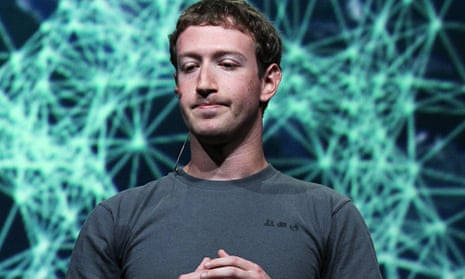Advances in the field of artificial intelligence are invariably greeted with concern about an imminent robot uprising. Similarly, when we hear about developments in the field of brain-to-brain communication, we imagine any number of outlandish scenarios: perhaps a government marching us unquestioningly into battle via a process of insidious mind control, or an erotic thought we had about a work colleague being unwittingly transmitted to our partner.
When Facebook’s CEO, Mark Zuckerberg, announced this week during one of his regular Q&A sessions that Facebook is working in the field of thought transmission, we found ourselves momentarily transported to a horrific telepathic future. “You’ll just be able to think of something and your friends will immediately be able to experience it too,” he said, as people thought to themselves “under no circumstances do I want anyone to know the dark, unsettling images that flash through my mind on an hourly basis”. We are troubled by that vision. But it’s only a vision.
When similar announcements have slipped out from the University of Washington or Harvard Medical School, people have barely noticed. But the words “Zuckerberg” and “Facebook” seem to prompt disproportionate fury; some people immediately imagined their thoughts directly transposed on to a Facebook wall, while others maintained their long-held position that “Facebook is awful because I say so”. But Zuckerberg’s allowed to dream. He’s allowed to ponder the trend from sharing photos to sharing video, and how that might extend to immersive virtual reality. Facebook’s three AI labs in New York, Menlo Park and Paris are currently working on technology that refines methods of deciding what we want to see and what we want to know. So it’s hardly surprising that the CEO of a social media company would airily predict some kind of all-encompassing sensory experience that, in his words, would enable “richer relationships with people we love and care about”.
But the precise nature of such predictions are so unfathomable that they may as well be outlines for a screenplay. Yes, scientists have managed to facilitate brain-to-brain communication – first between rats, then between human and rat, and then between human and human. Two years ago, scientists at the University of Washington managed to harness the brain signal from one person, and use that signal to magnetically stimulate the motor cortex of another person, inducing them to press the fire button on a computer game. Boom!
Last year an experiment was conducted whereby a computer interpreted someone in France thinking the word “hola”, and sent that information across the internet to India, where it was converted into a series of lights, induced in someone’s brain, that also represented the word “hola”. Yes-no responses have been transmitted between people using flashing strobes and non-invasive brain stimulation. But these experiments, while impressive, require very elaborate setups to crudely stimulate relatively large areas of the brain.
The kind of rich emotional telepathic experience Zuckerberg daydreams about would involve, one presumes, precise manipulation of the 100 billion neurons in the human brain – neurons that have more connections between them than there are atoms in the universe. In addition, brain-to-brain communication would involve the mediation of a computer – but it’s far from proven that a computer could ever capture nuanced thought, let alone things like sentience, consciousness and the way we feel.
Fierce arguments reverberate about the nature of the singularity, the point where artificial intelligence matches our own; some people, like Ray Kurzweil of Google, have a utopian view of man and machine in perfect harmony, while others believe that humans would be lucky to survive it. But it’s all conjecture. Zuckerberg might imagine our fleeting thoughts being transmitted with perfect clarity across Facebook, but a more realistic vision of the future might be of one person thinking of a cow, and someone else saying “are you thinking of a cow?”
During that Q&A, Zuckerberg said something that perhaps warranted more discussion than all the mind-melding stuff. “Our lives improve as our communication tools get better in many ways,” he said. “The increase in the power people have to share is one of the major forces driving the world today.” Again, it’s not surprising to hear this assertion from the head of a social media company but it’s far from proven to be true. Zuckerberg’s vision is one of infinite communication – but that’s not something our brains can cope with. If we eat a lot of food our brain knows we feel full, but in evolutionary terms we’ve never had to develop a feeling of being “full” of communication. The antipathy some people feel about social media might be the beginning of that. And if brain-to-brain communication does one day become a reality, it’s perfectly possible that by then we’ll just think, “no, thanks”.
